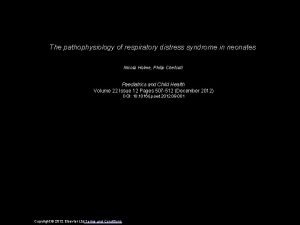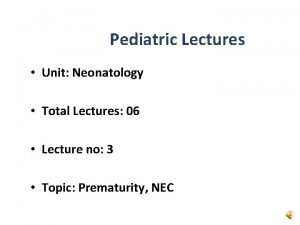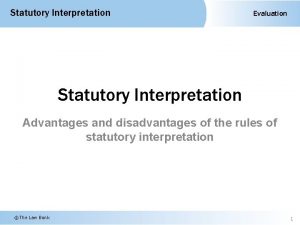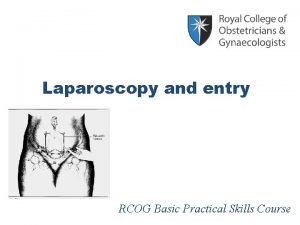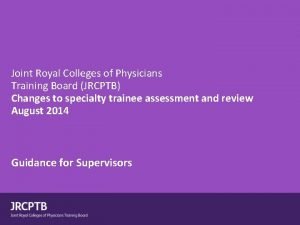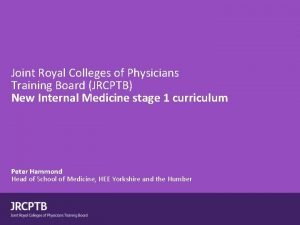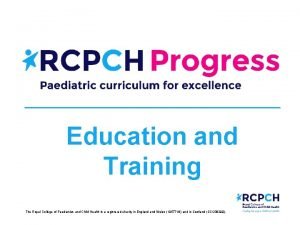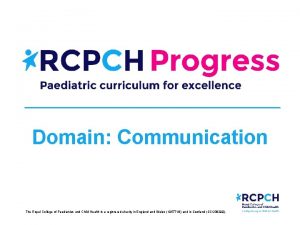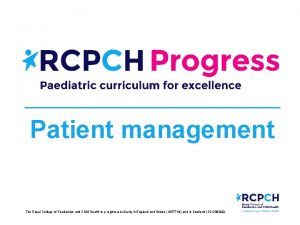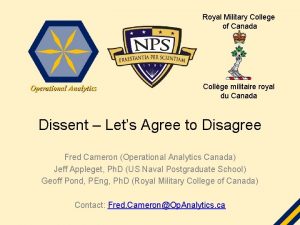Leadership team working The Royal College of Paediatrics
















- Slides: 16

Leadership & team working The Royal College of Paediatrics and Child Health is a registered charity in England Wales (1057744) and in Scotland (SCO 38299).

Curriculum overview Learning outcome Level 1 Recognises why leadership and team working are important in the paediatric clinical environment; works constructively within a team, valuing the contributions of others and developing personal leadership skills Level 2 Demonstrates an awareness of their own leadership qualities, adjusting their approach to improve outcomes. Participates effectively and constructively in multidisciplinary and interprofessional teams. Level 3 Leads in multidisciplinary team working and promotes an open culture of learning and accountability by challenging and influencing the behaviour of colleagues, supporting the development of leadership qualities and critical decision-making skills.

Curriculum overview Learning outcome Key capabilities Level Recognises why leadership and • 1 team working are important in the paediatric clinical • environment; works constructively within a team, valuing the contributions of others and developing personal leadership skills Supports appropriate decisions made within a team and communicates these effectively. Participates in local clinical governance processes.

Curriculum overview Learning outcome Key capabilities Level Demonstrates an awareness of • 2 their own leadership qualities, adjusting their approach to • improve outcomes. Participates effectively and constructively in multidisciplinary and interprofessional teams. • Demonstrates the qualities of a safe and effective leader. • Retains leadership qualities in situations of stress and conflict. Demonstrates leadership and team-working skills and relevant problem-solving strategies in clinical and management contexts, such as when there is a shortage of beds, medical staff or other resource. Takes an active role in promoting the optimum use of healthcare resources.

Curriculum overview Learning outcome Key capabilities Level Leads in multidisciplinary team • Engages effectively with stakeholders such as 3 working and promotes an open patients, families, charities and other healthcare culture of learning and organisations to create and/or sustain a patientaccountability by challenging centred service. and influencing the behaviour of • Meets patient need through working with non-clinical colleagues, supporting the or managerial colleagues to develop the skills development of leadership pertinent to the effective running of a paediatric qualities and critical decisiondepartment. making skills. • Leads in multidisciplinary team working. • Addresses challenging behaviour within the team.

Underpinning knowledge Leadership styles, principles approaches and techniques Supervision, appraisal and mentoring to promote a learning culture. Leadership & team working Managing conflict with the team, influencing, challenging. What makes a successful team, differing roles within a team

What is leadership? “If your actions inspire others to dream more, learn more, do more and become more, you are a leader. ” (John Quincy Adams)

What is leadership? A manager. . . A leader. . . • Instructs • Sets standards for behaviour • Implements strategy - 'how we are going to get there' • Sets objectives and tasks • Ensures processes are followed • Has power • Is respected due to their position • Enforces • Inspires • Influences others through their own behaviour • Drives strategy - 'where we are going' • Spearheads change/process improvement • Articulates or demonstrates a vision • Has authority • Is seen as a role model • Generates enthusiasm

Leadership & team working in daily practice Today I have. . . • Delivered an impromptu bedside teaching session for med students • Defused a heated situation with a patient's parent • Delivered difficult news sensitively • Participated in an MDT meeting • Given a colleague constructive feedback • Asked for feedback and advice • Effectively handed over of my patients at the end of my shift

NHS Healthcare Leadership model https: //www. leadershipacademy. nhs. uk/resources/healthcare-leadership-model/

The 'GROW' model Goal Reality Options Will What do you want Describe the to achieve? current situation What are your options? What actions will you take? Confirm the intended goal/outcome. Is it SMART? Will you be motivated to achieve it? Consider all options, identifying any obstacles and how to best tackle these. What would the outcome be of implemeting each option? Decide which to pursue. Identify the specific tasks/actions needed to make your plan a reality. Who needs to do what, and by when? How will you monitor progress and judge success? Fully assess the current situation, avoiding or challenging assumptions. What factors influence the existing reality?

Johari window Used to support improved: • Self awareness & personal development • Communication • Relationships Consider: • Which quadrants would be largest for you? • What are your blind areas and how can you decrease them? • Do you share enough (or too much!) with others?

Understanding different styles Introvert Extrovert Intuative Sensor Feeler Thinker Perceiver Judger Autocratic Coercive

Situational Leadership: different leadership styles are appropriate in different situations Kelley 1988, Rohde & Ford, 2007; Daft, 2007

What kind of a team member are you? Hersey & Blanchard situational leadership model

Useful training and resources • • Stepping up programme - transition to new consultant RCPCH Courses: Effective Educational Supervision/ Effective Educational Supervision Plus RCPCH Course: Mentoring Skills MSF 360 feedback assessment tool NHS Leadership Academy (https: //www. leadershipacademy. nhs. uk/resources/) London Leadership Academy toolkit (https: //www. londonleadershipacademy. nhs. uk/leadershiptoolkit) NHS Developing People – Improving Care framework (https: //improvement. nhs. uk/resources/developingpeople-improving-care/)
 Polysyllabic babble
Polysyllabic babble History taking paediatrics
History taking paediatrics Paed
Paed Lectures paediatrics
Lectures paediatrics London school of paediatrics
London school of paediatrics Royal college of occupational therapists
Royal college of occupational therapists Mischief rule definition
Mischief rule definition Royal military college of science
Royal military college of science Rcog course
Rcog course Aids to statutory interpretation
Aids to statutory interpretation Jrcptb
Jrcptb Jrcptb patient survey
Jrcptb patient survey Working hard vs working smart
Working hard vs working smart Cold working processes
Cold working processes Hot working and cold working difference
Hot working and cold working difference Machining operations
Machining operations Proses hot working
Proses hot working


